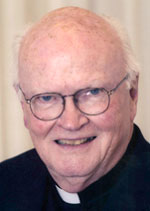There is an interesting discussion, some might call it a debate, making the rounds in Catholic health care circles these days relative to what the department or board committee that deals with the sacramental and spiritual needs of patients should be called.
Traditionally, this service has been known as “pastoral care.” Some are suggesting that it now be called “spiritual care.”
Some hospitals say they are changing because so many others are changing the name. It’s hardly a convincing rationale. Others explain that they are sensitive to the spiritual needs of patients who are not Catholic. A growing number of faith-committed patients are not Christian but have spiritual needs. To them, “pastoral” might sound too exclusively Catholic, hence the recommended change.
I haven’t heard anyone say so, but I suspect that for some, the word “pastoral” carries a male connotation. There are in fact many women, lay and religious, providing a welcome faith-based ministry to patients and their families in Catholic health care today. The descriptive title for both paid and volunteer ministers should accommodate itself to this fact.
Some Catholic hospitals have a 24-hour medical-ethics consultation service available to concerned patients or those who are making life-death decisions for them. Some of the hospitals that do not have this service consider it useful to add an ethical portfolio to the spiritual and create an ethics-and-spirituality department or a similarly named committee of the board.
A second-layer consideration in this discussion is how effectively the hospital deals with the reality of death and preparation for death while a patient is under its roof. Catholic hospitals pride themselves in their participation in the “healing ministry of Jesus” and often say so in their mission statements.
They are less explicit, however, about the fact that everyone Jesus healed subsequently died, even those he first brought back to life. And they know, but again, are less explicit on this point, that every patient will certainly, sooner or later, die.
They also know, as Renee Fox, the medical sociologist, put it in her famous book many years ago, that for many, if not most physicians, death is failure, but there are times when medical providers should have “the courage to fail.”
Hence, there’s the need to be there in the face of death, in a speaking, hearing, praying, touching way, with the dying patient. Pulling the curtain around the bed and “looking in” from time to time just doesn’t do it.
Most priests make frequent hospital visits; some work there full time. They typically carry “the oils” in their pocket along with a booklet titled “The Pastoral Care of the Sick.”
I like the term “pastoral” and am grateful that there are “clinical pastoral education” programs to certify men and women for this ministry. I do not know what is expected by way of certification for “spiritual” ministry in hospitals.
It should be remembered that visiting the sick, along with feeding the hungry and sheltering the homeless, is a corporal, not spiritual, work of mercy. “Pastoral” brings together the spiritual and corporal works of mercy. I would hate to see that word disappear from Catholic health care.
***
Jesuit Father William J. Byron is university professor of business and society at St. Joseph’s University, Philadelphia. Email: wbyron@sju.edu.




Share this story